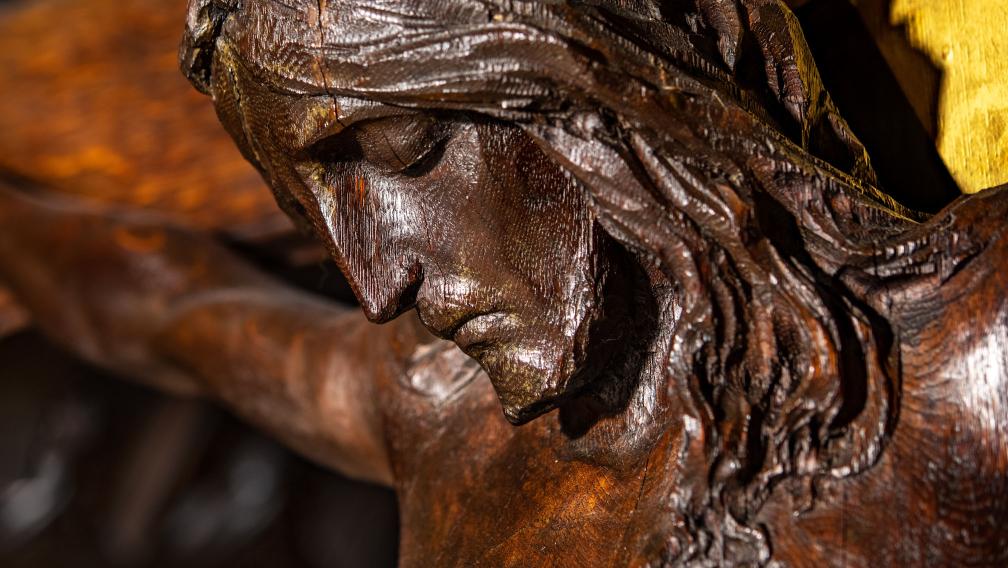When they came to the place that is called The Skull, they crucified Jesus there with the criminals, one on his right and one on his left. Then Jesus said, “Father, forgive them; for they do not know what they are doing.” And they cast lots to divide his clothing. The people stood by, watching Jesus on the cross; but the leaders scoffed at him, saying, “He saved others; let him save himself if he is the Messiah of God, his chosen one!” The soldiers also mocked him, coming up and offering him sour wine, and saying, “If you are the King of the Jews, save yourself!” There was also an inscription over him, “This is the King of the Jews.”
One of the criminals who were hanged there kept deriding him and saying, “Are you not the Messiah? Save yourself and us!” But the other rebuked him, saying, “Do you not fear God, since you are under the same sentence of condemnation? And we indeed have been condemned justly, for we are getting what we deserve for our deeds, but this man has done nothing wrong.” Then he said, “Jesus, remember me when you come into your kingdom.” He replied, “Truly I tell you, today you will be with me in Paradise.”
Luke 23:33–43
In this week’s Gospel, we turn to the horror of the crucifixion. Jesus experiences the physical and psychological humiliation of capital punishment under the brutality of the Roman Empire. He is ruthlessly mocked and shed of all dignity by the powers that be. Even the clothes off his back are haggled for. This must have felt like a cosmic blow to the hopes of the disciples who had — excepting a group of Jesus’s female followers — largely deserted the scene. The dénouement of Jesus’s ministry appears to be one of despair in the face of human violence.
But Luke suddenly injects this most harrowing of moments with a glimmer of unexpected hope. Even here, before a hint of Easter, one thief — dying on his own cross — experiences revelation. Here, at the eleventh hour, he recognizes something powerful — both about himself and about Jesus.
In his awareness of personal culpability, and Jesus’s innocence, the thief “comes to himself” like the prodigal son of Jesus’s famous parable (Luke 15:17). His identity is reframed in the light of Jesus’s identity, and what that means for all of humanity. The “penitent” thief therefore asks Jesus to “remember” him, a word that here connotes a true re-membering; the thief is aware of his once divided self and sees that Jesus — in his kingdom — can make all things whole.
Jesus assures this man that they will meet again after death, that the kingdom is just around the corner — another world where death does not have the last word and redemption is possible.
—Summerlee Staten
THEOLOGY
Vinita Hampton Wright on Jesus and the thief at the crucifixion.
SOCIAL JUSTICE
A Franciscan friar meditates on the “penitent thief.”
POETRY
The late Frederick Buechner writes poetically about what it means to be remembered, in light of the request made by the thief on the cross.
VISUAL ART
“Christ and the Two Thieves Crucified” at the Metropolitan Museum of Art
SOCIAL JUSTICE
The band The Boxer Rebellion considers “Redemption.”
Get the Five Ways In Your Inbox
Sign up to receive reflections and updates from the Faith Formation & Education team.
Coming Soon
Sunday, November 20 | 10am
Discovery: Creation, EarthCare and Environmental Justice
The Bible has a lot to say about our interconnectedness to Creation and stewardship of the earth. This week, eco-Philosopher and writer Lyanda Haupt joins Discovery to talk about her acclaimed book Rooted: Life at the Crossroads of Science, Nature and Spirit.
Fridays through Dec. 16 | 6:30–7:30pm
Trinity Book Club
Trinity Book Club meets weekly to discuss the mysteries of the Christian faith through the medium of literature. This session, we’ll read Art and Faith: A Theology of Making by Makoto Fujimura.
Wednesdays, Nov. 30 and Dec. 7 | 5:30pm
Sacred Ground Information Session
Join Trinity’s Sacred Ground group starting in January. Created by The Episcopal Church, Sacred Ground is a film- and readings-based dialogue series on race, grounded in faith. Small groups walk through chapters of America’s history of race and racism together, while weaving in threads of family story, economic class, and political and regional identity. The curriculum focuses on Indigenous, Black, Latino, and Asian/Pacific American histories as they intersect with European American histories. Contact Ruth Frey to learn more about this transformative program and to register.
January 6–8 | Trinity Retreat Center
Hide & Seek: Reading the Song of Songs with Poets
No book of the Bible maps the landscape of love — human and divine — like the Song of Songs. For centuries the Song’s depiction of love’s push-and-pull has fed Christian devotion. Unsurprisingly, some of the ancient poem’s best interpreters have been poets. On this retreat with Nate Wall, we’ll venture into the Song of Songs accompanied by Christian poets old and new.
